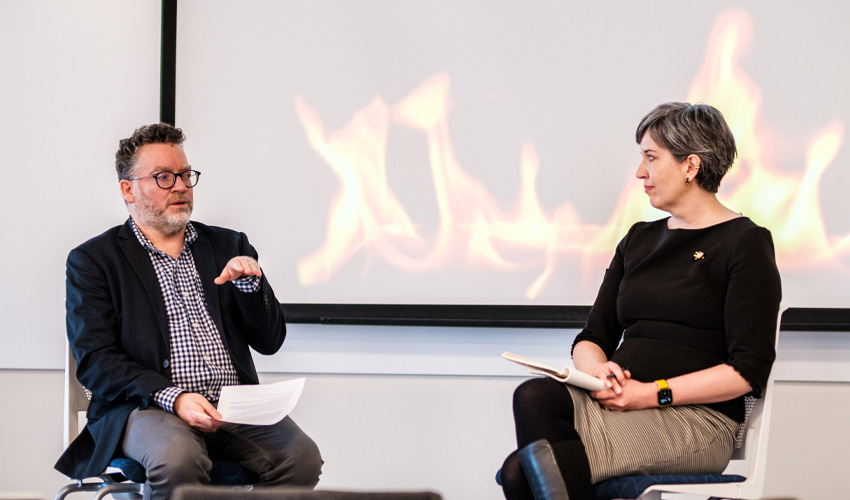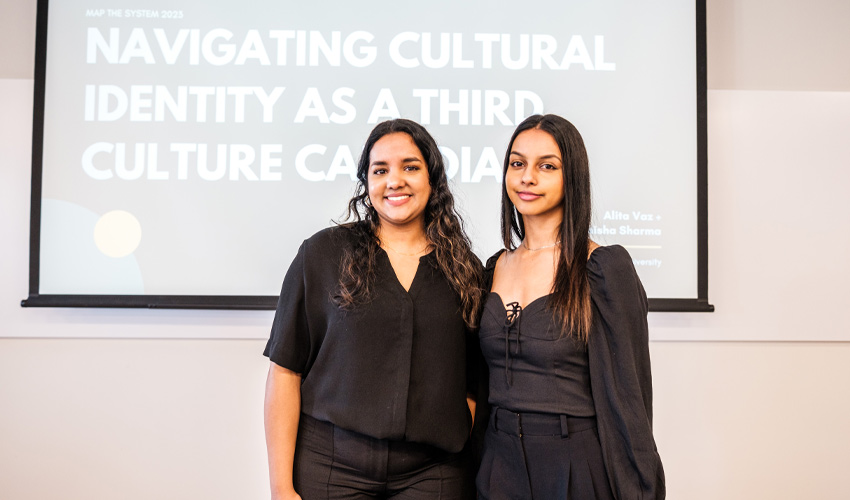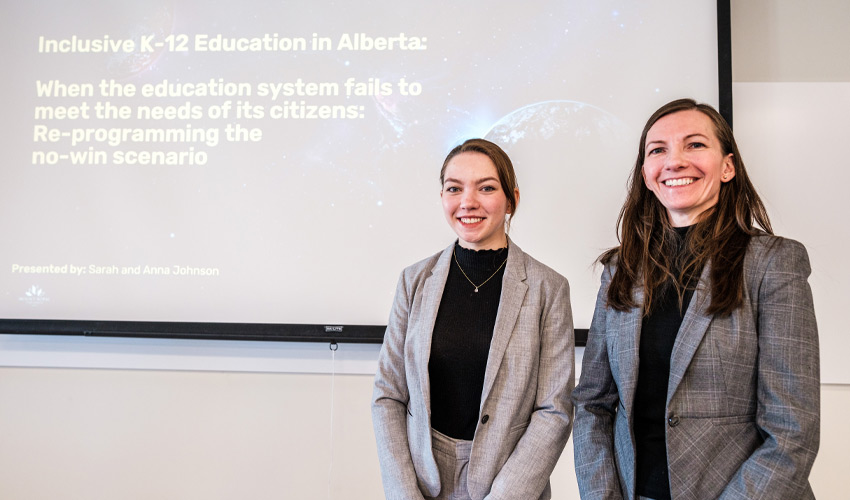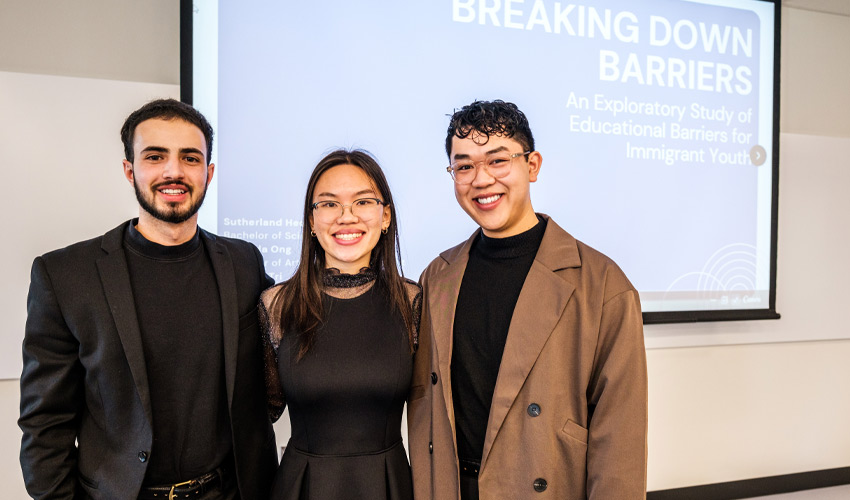Map the System 2023
Bold ideas to address systemic problems
— Mount Royal University | Posted: April 13, 2023

Mount Royal Institute for Community Prosperity director James Stauch and Andrea Klaiber-Langen, vice-president, Transformation at ATCO.
Map the System 2023 put the spotlight on navigating cultural identity and educational barriers in Calgary. The event had the top undergraduate student teams from across the campus provide a 10-minute presentation of their findings, followed by a question-and-answer period from judges.
The event also featured a conversation about how systems thinking optimistically reveals opportunity with Andrea Klaiber-Langen, vice-president, Transformation at ATCO.
The winning team moves on to compete at the Canada-wide final in May, with a chance to compete at the global finals at Oxford University in July.
Map the System is an initiative out of the Skoll Centre for Social Entrepreneurship based at the Saïd Business School at the University of Oxford. Mount Royal’s Institute for Community Prosperity’s mandate for Map the System is to “connect students with social-impact learning through applied, community-partnered research, creative knowledge mobilization and systems-focused education.”
This year, a total of 61 post-secondary institutions will hold Map the System challenges — 15 of them being Canadian academies. Faculty and staff work closely with students who are willing to undertake the immense challenge of discovering the root causes of systemic problems and apply an enactable solution. This work happens outside of the demands of their regular coursework.
"We struggle as a society to tackle issues such as the persistent and growing housing crisis, or the infodemic, or our struggle to bend advanced tech development toward the common good. A big part of this struggle is understanding. Why do such problems persist even though we pour millions into social science research, have a plethora of NGOs, social movements and public policies focused on any given issue, and have a more educated population than at any time in human history?
“One important reason is that we think asystemically. We view problems through the narrow scope of our professional siloes or academic disciplines. Our attention spans and time horizons are short, and our memories are amnesiac,” explains James Stauch, director of the Institute.
“Map the System challenges students to go well beyond their disciplines, to question not just practices, policies and structures, but deeply held assumptions, often at the level of culture and collective mental models.”
Representing MRU
Representing Mount Royal in the nationals for 2023 will be Alita Vaz (information design) and Amisha Sharma (criminal justice) for their study titled “Navigating Cultural Identity as a Third Culture Canadian.”
“Third-culture Canadians” are people who identify with another cultural background. They are often children of immigrant parents or immigrants themselves who have spent a significant amount of their developmental years in Canada. This can sometimes result in a “hybrid culture” that can bring on a cultural identity crisis.
“Our investigation consisted of desk research, an anonymous online survey, informational interviews with individuals with lived experience and subject-matter experts,” Sharma says.

Alita Vaz, left, and Amisha Sharma.
Vaz explains that the duo’s research suggests that despite Canada portraying itself to be an inclusive and welcoming nation to diverse cultures, there is still much improvement needed to assist third-culture Canadians in feeling a sense of belonging.
“There are a variety of systems in place that contribute to the cultural identity crisis of third-culture Canadians including the Canadian government, the Canadian school systems and Canadian society.”
This year’s event was adjudicated by Mount Royal anthropology and social innovation program alumnus Curtis Wong; Anna Johnson, who is the capacity building associate with the Calgary Foundation; associate professor of international business Dr. Jaqueline Musabende, PhD, and Kaitlyn Squires, the 2022 Map the System winner and a researcher with the EQuIS Research Platform.
System Map award
Anna and Sarah Johnson, a mother and daughter team, used their Map the System experience to explore inclusive kindergarten to Grade 12 education Alberta. Their study was called “When the education system fails to meet the needs of its citizens: Re-programming the no-win scenario.”
In Alberta, inclusive education policies are in place for those with learning differences, but a failure to meet those needs has strained the system. This lack of resources has left employees of the education system choosing who receives support.

Sarah Johnson, left, and Anna Johnson.
“The rippling effect of these issues has placed a strain on all students, guardians and teachers, where even the needs of the many have not been met,” Anna says, who is enrolled in policy studies.
Sarah, a sociology student, explains that system mapping identifies the relationship links and source issues where change must happen. “If the education system is at its breaking point, then it requires reframing the system.”
Inclusivity should describe a system of education for all and ensure society does not accept the no-win scenario. Two key findings from the research were government funding shortfalls and misdirected policies.
Best Presentation award
Amanda Ong and Thomas Tri from the University of Calgary teamed up with MRU biology student Sutherland Hedley to collaborate and find solutions to education disparity in Calgary. Their topic was titled: “Breaking Down Barriers: An Exploratory Study of Educational Barriers for Immigrant Youth.”
"We examined the educational barriers facing immigrant youth in east Calgary through conducting an extensive literature review, a survey sent to immigrant parents and interviews with key stakeholders,” said Tri.
Tri details that the group all have a personal connection with east Calgary, having gone to school and currently living in the area.

From left to right: Sutherland Hedley, Amanda Ong and Thomas Tri.
“East Calgary has a concentrated population of racialized immigrants, which sparked our interest in the intersection of race, ethnicity, class and immigration status.”
The team identified barriers to be the lack of multicultural training for teachers, lack of inclusive education for immigrant youth, lack of parental engagement due to various factors, crime and educational streaming.
“Although there were a plethora of barriers, there were also existing solutions in place such as equity funding, English-language learner integration and massive support from local non-profit agencies,” says Tri.
The team’s recommendations include: the need to co-create a curriculum with immigrant youth so that they are best represented, the need for an increase in accessibility of programs for immigrant parents to earn equivalencies for their foreign credentials as well as Canadian work experience, multicultural training for teachers to develop cultural competency and translation accommodations for immigrant parents in the education setting.

